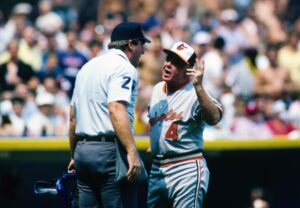
When I moved to Baltimore in 1980 and started following the Orioles, it was a great period for the team, and for its fabled manager, Earl Weaver. That’s not only my opinion, that’s what John W. Miller writes in his outstanding book, “The Last Manager,” the first true biography of Weaver.
Miller, who writes at length about Weaver learning about baseball from an uncle with mob ties, and that he was an actual prospect as a player, divides Weaver’s time with the Orioles into four parts.
The third part he calls “Earl’s Genius” was from 1977-1982. That’s when Weaver became a baseball celebrity. I was in the stands for some of Weaver’s great moments in the last three years of his first run, including his ejection by umpire Bill Haller and his final game in 1982.
Miller dismisses his 1985-1986 return as “Sad Comeback,” since Weaver admitted he came back for the money, and shouldn’t have done it.
Here are excerpts from a conversation with Miller:
Question: Could Weaver have managed in today’s game?
Miller: “He’d be really good at two things that are very valuable for managers. One is triaging information. I interviewed a dozen current managers for my book about the job they do today. They all said that a big part of the job is sorting out all the data that the Ivy League nerds produce. They have to distill it and communicate it to players who are often not college educated and often don’t speak English as a first language and they have to communicate what’s important in that data to help win baseball games, and I think that Earl Weaver with his b.s. detector and his kind of street smarts for numbers would have been really good at that.
“His leadership ability and charisma … Baseball teams still need a leader who can motivate young athletes, often well-paid during a long season where they often lose focus. There’s still a place for a motivational leader who has charisma like Earl Weaver. You see the value of a guy like [Bruce] Bochy or [Terry] Francona.”
Question: How did he win with different teams?
Miller: “People think it was just Frank and Brooks, and actually there were a bunch of different teams, and he won with all of them, and that’s what’s amazing. He bunted over league average the first half of his career because that suited his team because he had [Mark] Belanger, who couldn’t hit. He worked with the pieces he had. He really was a guy who believed that letting the other team make mistakes á la Paul Richards’ school, where you would play perfect defense, throw strikes and let the other team beat themselves and do what you could on offense. He was, not to begin with, an offensive-minded manager. That’s what the simplicity of his approach came with the experience of just trying to plug in as many guys who could hit home runs and walk as possible. That only came after 10 years of managing.”
Question: Was Weaver ahead of his time in appreciating analytics?
Miller: “Earl’s in the book, ‘Moneyball,’ and people always talk about him as this prophet of analytics, but nobody had ever looked at where he came from, his ideas. He got it from gambling, from street hustler’s intelligence. He never went to college. He didn’t read books. He was into figuring out things to gain an edge as a bookie would.”
Question: Late in Weaver’s career, he bought a sports jacket for a young player who didn’t have an acceptable one. Was he capable of doing nice things for people?
Miller: “He was a complicated guy, which is why he’s such a great character. He had this humanity and this gentleness to him. He never stopped changing and evolving, and his treatment of Black players is an example of that. He grew up in a very prejudiced environment and used racial slurs as a young man. In his memoir, he described it this way: ‘I evolved,’ and he helped Frank Robinson become baseball’s first Black manager. Eddie Murray and Ken Singleton, Reggie Jackson. They all adored him. I talked to Black players who said other coaches would be technically more polite, but condescending and had a kind of racist overtone, but Earl would be tough, but treat people the same.”
Question: Even though Weaver had a strong personality, you write that he worked well with others. Would that help him manage in today’s game?
Miller: “I think Earl would have been good about being part of the organization because that’s what he did with the Orioles for years in Thomasville, Georgia or different minor league towns. He was part of a huge structure when they were developing “The Oriole Way,” and he was very collaborative in that context.”
Call for questions: I answer Orioles questions most weekdays. Please send yours to: Rich@BaltimoreBaseball.com